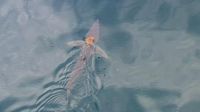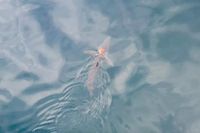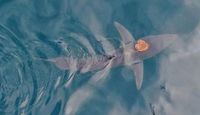In a remarkable underwater encounter off the northern coast of New Zealand, researchers from the University of Auckland captured a rare sighting of a Māori octopus riding on the back of a shortfin mako shark. This unusual event, dubbed the "sharktopus" by amused scientists, occurred during a December 2023 expedition in the Hauraki Gulf near Kawau Island.
The research team, led by marine biologist Professor Rochelle Constantine, was initially scanning the waters for shark feeding frenzies when they spotted a large mako shark with an unusual orange patch on its head. Confused by this sight, the researchers launched a drone and deployed a GoPro camera into the water to investigate further. To their astonishment, they discovered that the orange blob was not an entangled object but a living octopus clinging to the shark's head.
"It was definitely working to keep itself very contained on top," Constantine recounted in a blog post. "You could see a tentacle stray out every now and then." The team observed this fascinating interaction for about ten minutes, during which they noted the calm demeanor of both animals. Constantine remarked, "The shark seemed quite happy, and the octopus seemed quite happy. It was a very calm scene." However, after ten minutes, the researchers moved on, leaving the fate of the octopus uncertain.
The Māori octopus, known for its size and strong presence in the Southern Hemisphere, can weigh up to 12 kilograms when fully grown. It is typically found on the seabed, far from the mid-water hunting grounds of the mako shark. The shortfin mako, renowned as the fastest shark species, can reach speeds of up to 50 kilometers per hour (about 31 mph). This unique pairing of species, which rarely interact due to their differing habitats, has left scientists and marine enthusiasts alike intrigued.
As the footage of this extraordinary sighting spread across social media, it sparked discussions about the mysteries of marine life and the unpredictability of ocean ecosystems. Researchers speculated on the reasons behind the octopus's unusual behavior. One theory suggests that the octopus may have been seeking refuge from a predator, while another posits that it could have been a defensive tactic, allowing the octopus to blend in with the shark and avoid detection.
"How they actually found each other is the greatest mystery," Constantine said. "They have very different worlds." This sentiment was echoed by marine conservation ecologist Abigail McQuatters-Gollop, who noted the rarity of shark and octopus encounters. "You can see it takes a fair amount of real estate on the shark’s head," Constantine explained, highlighting the challenges the octopus would face in maintaining its grip as the mako swam.
The encounter not only captivated those who witnessed it but also served as a reminder of the importance of marine conservation efforts. Professor Constantine emphasized the need for continued research and protection of marine habitats. "Perhaps one of the best things about being a marine scientist is that you never know what you’re going to see next in the sea. By supporting conservation efforts, we can help to make sure that such amazing moments continue to occur," she stated.
While the sighting of the "sharktopus" might seem whimsical, it underscores the broader issues facing marine life today. Mako sharks, despite their impressive speed and predatory nature, are threatened by human activities such as overfishing and habitat loss. In 2023, there were only 47 unprovoked shark attacks reported globally, resulting in seven fatalities, highlighting that sharks are often more at risk from humans than the other way around.
As the fascination with the "sharktopus" continues to grow, it highlights the need for awareness and advocacy for marine environments. The unexpected meeting of these two species serves as a powerful illustration of the wonders of the ocean, reminding us of the mysteries that still await discovery beneath the waves.
As marine researchers continue to explore the depths of the ocean, they remain hopeful that encounters like this will inspire future generations to appreciate and protect the rich biodiversity of marine life. The "sharktopus" phenomenon may be a rare occurrence, but it is a testament to the endless surprises that the ocean holds.








